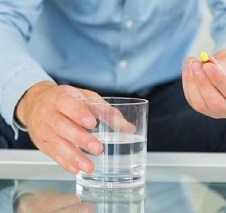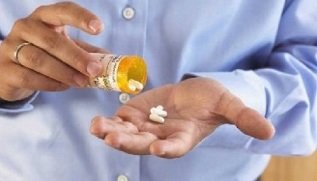
Antibiotics for chronic prostatitis are prescribed to eliminate the bacterial agent that causes inflammation of the gland.
The goals of antibiotic treatment are to relieve symptoms, prevent complications and restore normal prostate function.
The money is determined by the treating physician based on the test results. The generic name "antibiotics" means many groups of drugs of various compositions with strong antibacterial activity.
True antibiotics are substances of natural (natural) origin or their complete synthetic analogues.
Classification of chronic prostatitis
There are three main types of chronic prostatitis:
Chronic bacterial prostatitisis a prostate lesion associated with the development of pathogenic microflora. It progresses with symptoms similar to those of acute prostatitis (pain when urinating, presence of pus and blood in the urine, etc. ), but has more blurred (facilitated) manifestations.Therefore, regardless of the type of chronic prostatitis, the use of antibiotics is recommended in all cases. The drugs used in the designation of therapeutic practice as drugs of choice will be discussed below. And you should start by offering readers antibiotics for the chronic prostatitis list.
What antibiotics are there?
In recent years, the resistance of bacteria to certain drugs has increased sharply, so before starting treatment with antibiotics for prostatitis in men, it is necessary to examine the patient for the whole group of STDs and the pathogenic flora to determine theresistance of certain microorganisms to certain drugs.
What antibiotics to treat prostatitis at home? There are the following groups of antibacterial drugs (the best antibiotics for prostatitis in men):
- Penicillins.In the past, such antibiotics were actively used for prostate inflammation, with the advent of the most active antibacterial drugs, virtually losing their clinical significance due to the increasing number of negative penicillin-resistant bacteria.
- Macrolides.These antibiotics for prostatitis have a wide range of action and low toxicity.
- Tetracyclines. They have activity against gonococci, chlamydia, mycoplasma. They are most often used in the treatment of chronic infectious prostatitis caused by the above pathogens.
- Fluoroquinolones.Often used for the complex treatment of chronic prostate inflammation and in acute simple prostate inflammation (efficiency up to 100%). They have high activity and low toxicity (do not disturb the intestinal microflora).
- Cephalosporins.It is actively used in the treatment of acute forms of bacterial prostatitis. These are good antibiotics for prostatitis, have a wide range of action and high activity against pathogenic bacteria.

At the same time, modern medicine uses antibiotics for prostatitis or other diseases because of their potential:
- quickly destroys the source of the disease and eliminates inflammation.
- produces substances that kill or stop the growth of bacteria and large viruses, but are safe for the cells of the macro-organism.
- act when applied externally (suppositories, ointments) and by other methods of administration: intramuscularly, orally, intravenously.
- for the simultaneous control of many pathogens (broad-spectrum antibiotics).
What are the most effective antibiotics
To treat or reduce the symptoms of infectious prostatitis, strictly follow your doctor's recommendations. Only start the course after the diagnosis, when the doctor understands the nature of the disease. Self-medication at home is fraught with devastating consequences, dysfunction of body systems.
Recommendations for antibiotic treatment
Side effects from taking antibiotics can be as annoying as worsening prostatitis.
Typical disadvantages of each drug group:
- Penicillins: rash, dermatitis, diarrhea.
- Cephalosporins: diarrhea. Rash and fever are rare.
- Macrolides: nausea, vomiting. Sometimes colitis occurs, cholestatic jaundice.
- Fluoroquinolones: abdominal pain, diarrhea.
Diarrhea is the most common side effect of antibiotics. It is caused by two reasons: an imbalance of the intestinal microflora, an overgrowth of bacteria called Clostridium difficile. It is possible to prevent and eliminate diarrhea while taking pro- and prebiotics.
Non-antibacterial therapy
In addition to antibiotics, the following treatments are used to successfully treat prostatitis, especially chronic prostatitis:
- Prostate massage is the best way to improve blood supply and eliminate inflammatory secretions from the prostate.
- physiotherapy?
- non-steroidal anti-inflammatory drugs - not used in combination with fluoroquinolones.
- herbal preparations?
- alpha blockers.
In order to effectively treat a disease, it is necessary to perform diagnostics that will show the type of bacteria that cause the disease in a particular patient, their sensitivity to drugs. Based on the test results, the doctor decides which means to treat chronic prostatitis or an acute form of the disease.


























